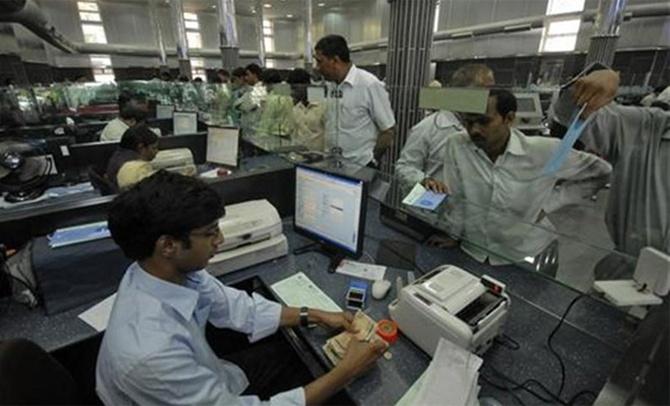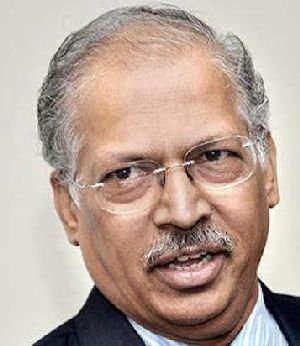
'These are only passing clouds. The banking industry is a century-old industry and this is not the first time it is going through such a crisis.'
'When the economy revives, those companies in the infrastructure fields will also get revived.'
'After all, a lot of money has gone into creating assets like power projects and roads, so you can't say money has been wasted.'
S Chandrasekharan, is a retired executive director of UCO Bank and a former general manager, Indian Overseas Bank.
Chandrasekharan, below, left, spoke to Shobha Warrier/Rediff.com
In the early nineties, the banking sector in India went through tough times. As a former banker, how do you compare it with the situation right now? Is it grave now?
I would say the situation is the same. At that time also, non-performing assets was very chronic; it is the same now also.
The difference today is that the NPAs are from core sectora like infrastructure, power, coal etc while the NPAs in the nineties were trade accounts. But the NPAs in the core sector today happened due to external factors.
Was it right on the part of the Reserve Bank of India to suddenly ask all the banks to declare the NPAs? Some bankers say that some good accounts also became NPAs because of the RBI's decision. Do you feel so?
If the accounts were good, they would not have become NPAs.
What the RBI says is, because of the consortium arrangement, there are many accounts of the same borrower in various banks and he was paying interest wherever he was getting additional facilities. So, in the bank he was paying the interest, it became a standard asset while in another it was an NPA.
The RBI found this dichotomy unacceptable and as a regulator, it wanted all the banks to declare such accounts as NPA even if it was an NPA in only one bank.
That is the reason why some banks are saying that the account was doing well with me, but I am forced to declare it as NPA.
Some bankers are of the opinion that these are long-term projects and they became sick because of the global economic slow down….
But you have to call a spade a spade at some point of time. Only if you put them under the NPA, the banks would be able to restructure or start a recovery process.
Recovery is possible only if the borrower is not in a position to repay at all.
The RBI wants the banks to segregate an account of performing asset from a non-performing asset.
Yes, one of the major reasons why most of the projects got stuck was due to coal. After the coal scam, the entire mining scenario got stuck.
Nobody was given licences and those who were excavating stopped excavation. Coal became dearer and imports became costlier after the rupee was devalued.
Now slowly the state governments have started giving licences. Maybe in another year or two, there will be a revival of the coal industry.
With the revival of the coal industry, the power sector also will perform well. Once the power sector picks up, work in infrastructure will start which will give a boost to the steel sector.
It is another matter that all over the world, the steel industry is in the doldrums.
Even if you have declared all those accounts as NPA in these sectors, a revival may change their fortunes and the accounts can become performing accounts.
Yes, one school of thought is that at least in infrastructure, there should have come up with a different rule to make accounts as NPA as the factors are external.
 Is this the only reason why so many public sectors went into the red all of a sudden?
Is this the only reason why so many public sectors went into the red all of a sudden?
It is one of the major reasons. Each bank takes its time to declare an asset as NPA depending upon their balance sheet.
They generally don't declare the entire thing as a bad asset. Because of the RBI's decision, they have to declare now, but this will go on only till March 2017. Not beyond that.
The difference is that instead declaring a bad account in five years, it has been done in one year.
So the reason for many banks showing red in the December quarter is mainly because the RBI has asked the banks to declare their NPAs.
RBI representatives were on the board of all banks. Who is responsible for the NPAs and bad loans?
There are two types of NPAs. One is of fraudulent types and another due to external factors like the units that are affected by the slowdown in the economy.
The truth is, the majority of NPAs come in the second category.
There is a kind of herd mentality in banks. When liquidity was very good and funds were available, many of the industries must have approached many banks.
What happens is when bank X and Y are giving money saying the account is very good, Bank Z also thinks why I should not give loans to those projects?
This herd mentality happens not only in public sector banks, but in private sector banks too. They also gave loans to all those projects.
Yes, the Reserve Bank members were also there on the board and they were all aware too.
There was no problem when things were going well, but only when all the external factors like the mining, power and steel industry slowed down, the projects which were once described as good suddenly became bad loans.
Because of this, maybe some of the borrowers would have diverted the money to some other projects like trade or real estate. Now, real estate is also in the doldrums.
Now, the RBI says if the money is not utilised for the purpose for which the loan was taken, the diversion has been described as fraudulent.
You cannot blame the board or the RBI members for this as things were going well when the loan was sanctioned.
Reports say wilful defaulters owe banks Rs 4 lakh crore. Vijay Mallya owes Rs 9,000 crore (Rs 90 billion). How did banks go on lending to these defaulters?
Like I said earlier, if the money is not utilised for the purpose for which it is lent, he is called a wilful defaulter as per the new rule.
When there was multiple banking and consortium, when a loan was given from one bank for an infra project and the borrower used it to buy property, he becomes a wilful defaulter. He becomes a wilful defaulter not in the beginning, but only at a later stage.
Maybe there are rare cases of lending money to a defaulter even if the unit becomes an NPA. It is only few and far between. I don't think banks generally give money to an account that has been declared as NPA.
There is panic in the Indian economy right now because of so many PSBs going red. Is this panic warranted?
It is not a panic situation and there is no need to press the panic button.
When the economy revives, those companies that are in the infrastructure fields will also get revived. After all, a lot of money has gone into creating assets like power projects have started and roads have been laid, so you can't say money has been wasted.
It is better to wait for the revival of the economy so that the projects, which are already started, take off again.
In the nineties also, most of the banks were in red and the government had to rescue many banks. I don't think it's a very bad situation now.
Because public sector banks cannot go to the market for money, the government has to come forward to recapitalise them.
The government has now put in Rs 1,000 crore (Rs 10 billion) in three banks. Will the government pumping in money solve the problem?
It will solve to some extent. There is a deadline from the RBI to solve the problem of NPAs within March 2017.
Once that disclosure takes place, you need money for provisioning. The money, which is given, now will help in two ways. One is, it will improve the loan book. No bank can take the decision that they cannot lend from tomorrow.
Without lending, a bank cannot survive, as lending is the prime activity and responsibility of any bank.
When the income generation improves, it will take care of further previsioning. So capital inflow is needed and it should continue. So the government pumping in money will definitely help the banks.
There is also criticism that the RBI is trying to implement norms like Basel 3 in India. Some bankers say that Indian banking industry is not ready for such norms, which are practiced in Western countries. Do you agree?
Basel 3 is given to the regulator to regulate the banks. So many countries all over the world have not used these norms and even the RBI can think of tweaking the norms for India.
What is the solution to the current crisis? Is it only the revival of the core sector that can revive the banking sector too?
The major solution is the revival of the economy through infrastructure, mining power, coal, etc.
Is downsizing or mergers an answer?
Mergers, acquisitions and downsizing are nothing but adding to the balance sheet. It can only reduce the overheads; it will not help reduce the NPAs. You will not answer any of the problems in the banking sector by doing so.
The government, I think, is thinking of reducing its stake from 51 per cent. For that valuation has to go up. For the valuation to go up, profitability of the bank has to go up.
Do you feel the RBI should have waited for the economy to revive and then asked the banks to declare the NPAs?
Some economists and some bankers also say this. But it seems the government agrees with what the RBI did. Otherwise, they would have come up with a statement.
I think the government is confident that the economy will revive. Just look at the amount of money they are going to pump in the infrastructure sector. Once infrastructure revives, all these problems will get solved.
What is your feeling about the crisis as a former banker?
These are only passing clouds. The banking industry is a century-old industry and this is not the first time it is going through such a crisis.
Reports say the monsoon is going to be good this year. That will revive the agricultural sector. With that, demand and supply will improve.
Once the wheel starts moving, it is only a matter of time for the situation to change. That's why I feel there is no need to press any panic button.










